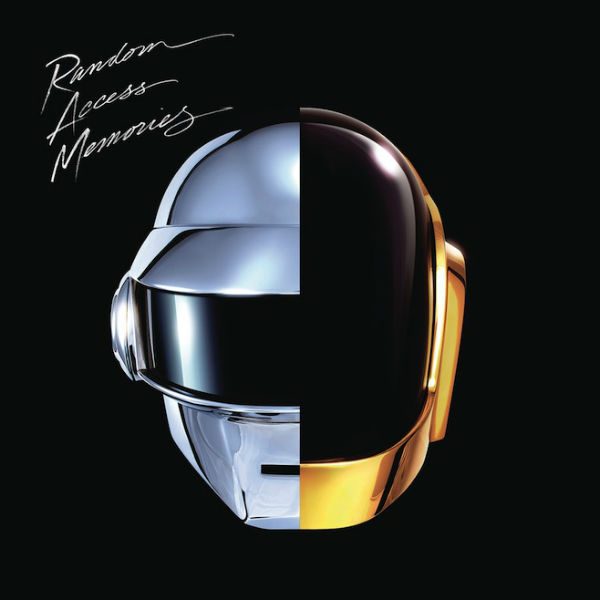Words by Peter Quinton
During his interview at the helm of “Giorgio by Moroder,” legendary disco producer Giorgio Moroder, regarding his implementing of synthesizers in disco, says, “I knew this could be a sound of the future, but I did not realize the impact that it would have.” This simple – yet heavy – statement should not be taken lightly: Moroder’s contribution to Random Access Memories, Daft Punk’s long-awaited return LP, might be minimal, but his spiritual influence on Daft Punk’s music, as well as all dance music from the past 30 years, is immense. However, I don’t think a single album in this stretch of time has so convincingly embodied and celebrated this influence more than RAM, a show-stopping record that reaches for dance music’s past while aiming towards the future in order to, as Daft Punk proclaim, “Give Life Back to Music.”
Daft Punk themselves have done quite a bit of influencing in the past 15 years or so: Their stylish use of processed vocals, club beats, and ecstatic samples have become commonplace in pop music, their robotic disguises have become iconic, and their monolithic live shows from 2007 proved EDM (electronic dance music) could be an enormous live spectacle. But while the EDM craze has taken the world by storm since Daft Punk’s last release, 2004’s Human After All, RAM comes off more as an arsenal used to slay the monster the duo has so strongly influenced.
On their new record, Daft Punk largely forego the sampling that made up the bulk of their previous albums (save for the albums epic, space-aged finale, Contact) in favor of live instrumentation from a number of legendary contributors and session players. It’s an audacious move – one that may not please a few fans out there – but one that works to breathe new life into Daft Punks sound, as tracks like the celebratory “Give Life Back to Music” and the grooving, romantic “Instant Crush” (featuring sweetly digitized vocals from Strokes singer Julian Casablancas) preserve the duo’s distinct personality while adding rich, lush textures and details not heard on a Daft Punk record before.
The attention to detail found throughout RAM is a testament to the duo’s larger-than-life ambitions, resulting in an undeniably larger-than-life album in the process. With 13 tracks spanning over 75 minutes, RAM is a massive experience of dance-pop grandeur with big ideas, broad scope, and plenty of studio muscle to pull it all off convincingly. Many of RAM’s best tracks feel like mini musical adventures within themselves, including the aforementioned “Giorgio by Moroder,” which stretches and builds for nine minutes atop an ultra-funky synth groove and ends with a brawny guitar solo, and “Motherboard,” a dense instrumental piece which swirls together foggy synths, sparse acoustic guitars, and even woodwinds to craft light-as-air beauty.
These moments, however, are dwarfed by the absolutely grandiose “Touch,” RAM’s centerpiece and Daft Punk’s closest approximation to “A Day in the Life.” Featuring collaborator Paul Williams on vocals, “Touch” is a widescreen, fully cinematic experience of a track which ebbs and flows through heartfelt piano balladeering, an electrifying disco breakdown, a symphony, a freakin’ childrens choir, and the endearing, skyward hook “Hold on / If love is the answer you’re home.” It’s a track so full of pomp and indulgence it could have easily crashed and burned, but when discussing the album with people, the first thing I tends to come out of their mouths is, “I remember ‘Touch.’”
It’d be easy to say that RAM is bloated and over indulgent, and in a sense, you wouldn’t be too far off. But while each track is meticulously crafted and produced, some of the album’s strongest moments are its most simple and danceable. Take album singles “Get Lucky” and “Lose Yourself to Dance,” which are both centered on funk-guitar wizard Nile Rodger’s crisp rhythm guitar and Pharrell William’s soulful falsetto. These lively bits of robo-disco, which maintain a steady, singular momentum throughout, are deceptively simple, and recall the joyous euphoria of previous Daft Punk standouts “Around the World” and “One More Time.” A more unique standout is “Doin’ it Right,” a swirling, hypnotic track with a melody almost completely built around the looping vocals of Daft Punk and contributor Panda Bear. It’s a bit jarring at first, but the quaint little track-that-could proves to be one of the albums most infectious and sweetest grooves.
Daft Punk’s extravagant new album might be a well-tempered response to the “laptop-ification” of electronic music and its artists (whom Daft Punk have openly criticized) in some sense, but the grand ambitions of Random Access Memories really stems from the fact that Daft Punk are just huge fans. In a sense, RAM is the duo’s dream album, bringing together some of the best session players and contributors they idolized to craft an album that holds nothing back, mixing together the sounds of generations past that they love with utmost sincerity. The end result is the ultimate love letter to the evolution of dance music; one that Daft Punk clearly made for their own fulfillment, but is fun and engaging enough for all of us to want to join the ride.
“Random Access Memories”
Columbia
© May 21st, 2013
http://www.daftpunk.com/
TheWaster.com | Robot Rock
06.3.13



